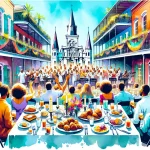New Orleans boasts a profound African American heritage and culture, woven into its artistic expressions, culinary traditions, and community spirit. Explore the depth of this legacy through immersive tours, historical sites, museums, and authentic experiences that celebrate the contributions and resilience of the city’s Black community.
In This Article
TL;DR
- Immerse yourself in the African American origins of jazz music and the influential figures who shaped this iconic art form.
- Savor the flavors of soul food and African-inspired dishes at renowned Black-owned restaurants and culinary institutions.
- Gain insights into New Orleans‘ pivotal role in the civil rights movement through guided tours and visits to significant historical sites.
Birthplace of Jazz: Exploring the African American Roots
New Orleans is widely regarded as the birthplace of jazz, a musical genre that emerged from the fusion of African and European musical traditions. The city’s African American community played a pivotal role in shaping this iconic art form, with legendary figures like Louis Armstrong, Jelly Roll Morton, and King Oliver leaving an indelible mark on the city’s musical landscape.
Visitors can immerse themselves in the rich jazz heritage by exploring the vibrant music scene on Frenchmen Street, attending live performances at iconic venues like Preservation Hall, or visiting the New Orleans Jazz Museum to learn about the genre’s origins and evolution.
Culinary Heritage: African Influences on New Orleans Cuisine
The culinary traditions of New Orleans are a testament to the city’s diverse cultural influences, with African American cuisine playing a significant role. From the iconic gumbo and jambalaya to the beloved beignets, the flavors and techniques of African American cooking have left an indelible mark on the city’s culinary landscape.
Visitors can savor the authentic flavors of African American cuisine at renowned establishments like Dooky Chase’s Restaurant, a historic eatery that has been serving up soul food classics since the 1940s. Additionally, exploring the city’s vibrant food scene and supporting Black-owned restaurants is an excellent way to experience the rich culinary heritage of New Orleans.
Guided Tours: Exploring Black History
Mikhala Iversen’s All Bout Dat Tours: Off the Beaten Path Explorations
Mikhala Iversen’s All Bout Dat Tours offer a unique and immersive experience, taking visitors off the beaten path to explore the lesser-known facets of New Orleans’ Black history. These tours examine the city’s historic neighborhoods, such as Tremé, the oldest African American community in the United States, and Congo Square, where enslaved Africans gathered to preserve their cultural traditions.
Tours by Judy: Civil Rights Tours with a Former History Teacher
Judy Geddes Bajoie, a former history teacher and New Orleans native, offers captivating Civil Rights Tours that explore the events and sites that foreshadowed the national Civil Rights Movement. Participants can expect to visit significant locations like Congo Square, the Mahalia Jackson Theater for the Performing Arts, and Homer Plessy Way, gaining a deeper understanding of the city’s pivotal role in the struggle for equality.
Self-Guided Tours
Louisiana Civil Rights Trail: A Journey Through Key Historical Sites
The Louisiana Civil Rights Trail is a self-guided tour that takes visitors on a journey through the state’s civil rights history. Developed by the Louisiana Office of Tourism, this trail features markers and exhibits that commemorate the courage and determination of those who fought for racial equality.
Congo Square: The Heart of African American Culture in New Orleans
No visit to New Orleans is complete without exploring Congo Square, a site steeped in history and cultural significance. This iconic location, now part of Louis Armstrong Park, served as a gathering place for enslaved Africans to preserve their cultural traditions, music, and dance. Visitors can immerse themselves in the rich history and vibrant atmosphere of this historic site.
Key Historical Sites and Museums
Louisiana Civil Rights Museum
The Louisiana Civil Rights Museum is a must-visit destination for those seeking to understand the state’s civil rights history. Established by Lt. Governor Billy Nungesser and the Louisiana Office of Tourism, this museum features exhibits and narratives that shed light on the struggles and triumphs of the civil rights movement in Louisiana.
New Orleans African American Museum
The New Orleans African American Museum is dedicated to preserving and promoting the history, art, and communities of African Americans in New Orleans and the African diaspora. Through its exhibits and educational programs, visitors can gain a deeper appreciation for the contributions and experiences of the city’s Black community.
Whitney Plantation
The Whitney Plantation stands as a powerful testament to the tragic history of slavery in the United States. Unlike many other plantations, Whitney’s mission is to tell the true story of slavery, honoring the lives and experiences of the enslaved Africans who toiled on its grounds. Visitors can explore the museum, memorials, and exhibits that shed light on this dark chapter of American history.
Cultural and Culinary Experiences
African and Black Cuisine in New Orleans
New Orleans’ culinary scene is a vibrant tapestry of flavors, with African and Black cuisine playing a significant role. From Cameroonian and Gambian dishes at Fu-fu to elevated Senegalese cuisine at Dakar NOLA, visitors can savor the rich and diverse flavors of the African diaspora.
Supporting Black-owned restaurants is not only a culinary experience but also a way to engage with and support the local community. Many of these establishments have deep roots in the city’s cultural heritage and offer a unique window into the traditions and flavors that have shaped New Orleans’ culinary landscape.
Music and Performance Arts
The influence of African Americans on New Orleans’ music scene cannot be overstated. From the birth of jazz to the vibrant Mardi Gras Indian traditions, the city’s musical and performance arts are deeply intertwined with its Black history and culture.
Visitors can immerse themselves in this rich cultural tapestry by attending live music performances, participating in Mardi Gras Indian events, or exploring the city’s music venues and cultural centers. These experiences offer a unique opportunity to connect with the living traditions and artistic expressions that have shaped New Orleans’ identity.
Engaging with the Community
Community Events and Workshops
To truly understand and appreciate the depth of New Orleans’ Black history, engaging with the local community is essential. Participating in events and workshops organized by organizations like the People’s Institute for Survival and Beyond can provide valuable insights into the ongoing efforts to address racism and promote social justice.
These events often include “Undoing Racism/Community Organizing” workshops, which explore how individuals are socialized and conditioned to think about race and racism. By engaging in these discussions and learning from community leaders, visitors can gain a deeper understanding of the city’s complex history and the ongoing work towards equity and inclusion.
Supporting Black-Owned Businesses
Beyond patronizing Black-owned restaurants, supporting other Black-owned businesses in New Orleans is a meaningful way to engage with and uplift the local community. From bookstores and museums to tour operators and artisans, these establishments offer unique products, services, and experiences that celebrate and preserve the city’s Black heritage.
By consciously choosing to support Black-owned businesses, visitors can contribute to the economic empowerment of the community and ensure that the rich cultural traditions of New Orleans continue to thrive for generations to come.
Tips for Visitors
Best Times for Engagement
While New Orleans offers opportunities to explore its Black history year-round, certain periods may be more conducive to fully immersing oneself in the city’s cultural events and traditions. For example, attending during the Mardi Gras season or during festivals celebrating African American culture can provide a more vibrant and authentic experience.
It’s essential to research and plan ahead to ensure that your visit aligns with the events and activities that resonate most with your interests and desired experiences.
How to Participate Respectfully
When engaging with cultural sites, events, and communities, it’s crucial to approach with respect, openness, and a willingness to learn. Adhere to any guidelines or protocols established by local organizations, and be mindful of the sensitivity and significance of these experiences.
Engaging with local guides, experts, or community members can provide invaluable insights and perspectives, fostering a deeper appreciation for the rich history and cultural traditions of New Orleans’ African American community.






